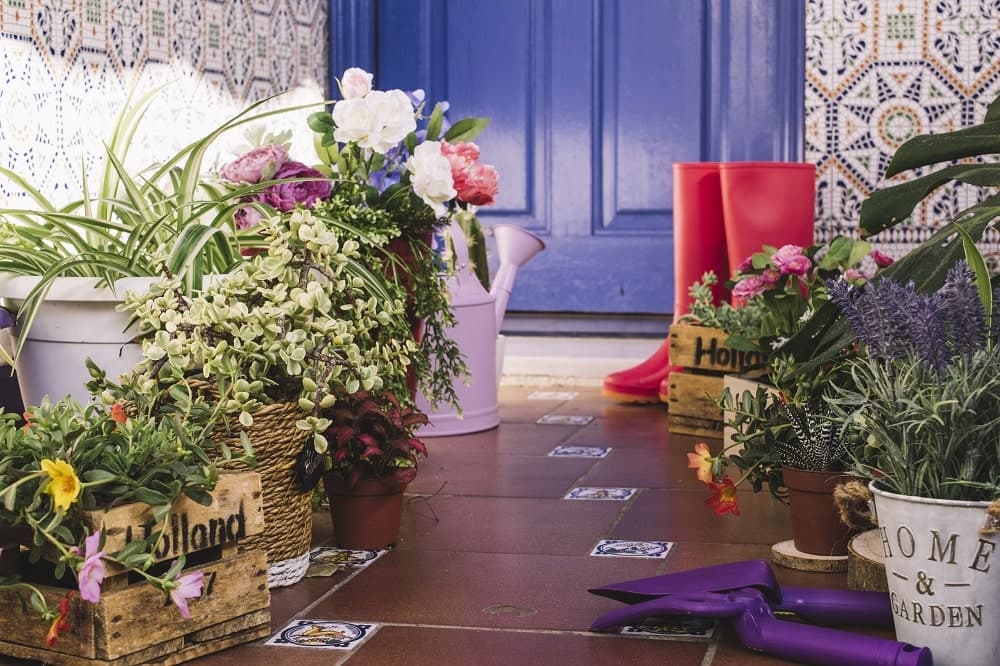
Even indoor gardening may be relaxing and therapeutic for some people, and having plants around the house can also boost your mood, productivity, and ability to cope with stress.
Whether you have one plant or a jungle’s density, whether you have a green passion or not, here are some plant-care methods and gardening hacks that can keep your greenery alive and luscious. If you have never done it before, start here and try out some easy garden hacks. We have some amazing gardening tricks and tips for beginners.
01. The Power of Cinnamon

Along with a wonderful aroma, cinnamon also has anti-fungal properties. Apply cinnamon powder to seedlings to avoid some plant diseases. Use it to ward off some pests and insects and treat illnesses that affect seedlings.
Diseases known as “damping off” are the bane of seedlings. It is the hairy, grey-white fungus that grows on the seedling stems at the point where they touch the starting soil. Cinnamon, when applied to afflicted seedlings, can kill the fungi that are causing the disease and prevent its possible spread. You can sift cinnamon into your starter mix after planting the seeds. So, if you are looking for some garden hacks that actually work, apply cinnamon to the affected seedlings.
02. Coffee For the Plants?

To keep ants, snails, and slugs away, use coffee grounds. It works well as fertiliser for plants that love acid. Coffee grounds work best as a mulch when combined with other coarse organic mulches due to their fine texture.
If applied alone, coffee grounds can compress and dry the soil, keeping moisture outside rather than inside. Coffee’s high nitrogen content can slightly change pH to promote flowering, aerates the soil, and improves soil texture, making it an excellent addition.
03. Do Not Throw the Banana Peel

One of the best gardening hacks for beginners is adding banana peels to the soil. Banana peels can be fruitful for your plants in many ways. You can also sprinkle your dry leaves with a banana peel. It removes dust, although it might also leave some banana muck behind. If you don’t mind that, it’s a nice reuse idea. Also, bananas can help repel insects.
Banana peels are a great source of nutrients for your indoor plants and yard in general. There are different chemicals found in peels in the following manner that may help in the different growth processes of your plants.
- Calcium in banana peels encourages root growth and helps the soil get more oxygen.
- Magnesium aids in photosynthesis.
- Sulphur promotes the growth of robust roots and insect repulsion in plants
- Phosphorus enhances fruit and flower production and aids in pollination, seed germination, and viability.
- Potassium helps plants grow more vigorously overall, bolsters their resistance against pests and diseases, and promotes fruit production.
04. Eggs Can Give You More Than Protein

One of the best tricks for gardening is adding eggshells to the soil. Calcium is abundant in eggshells, which helps balance the pH of soil. Your plants could enjoy it if you use water from hard-boiled eggs, since some calcium ends up in the water. Eggshell calcium carbonate lowers soil pH, making it more alkaline than acidic. For absorbing nutrients and fending off harmful substances like aluminium, many plant species require low soil acidity.
Some plants, such as tomatoes, will develop black spots on the tips of their fruit because of a calcium deficiency. Fertilizing with eggshell calcium can encourage fruiting and prevent rot.
05. Citrus Benefits for Green Health

Citrus peels are a great source of potassium, phosphate, and nitrogen. They are a wonderful way to add nutrition to compost. To hasten the composting process, make sure to chop up citrus peels before adding them to the compost pile.
Additionally, since many pests and decomposers do not really enjoy the smell of compost, citrus peels shield it from them. Instead of applying chemical pesticides, simply rip citrus peels into little pieces and scatter them around the damaged plant if your plants have a slight bug infestation. Such a gardening trick will keep pests away from plants.
06. Keep Your PH Under Check

Check your home’s soil pH. Although this test won’t give you an exact number, it will indicate if your soil is acidic, neutral, or alkaline. If your soil’s pH value stays at or around 7 (between 6 and 7.5), it is neutral. Below pH value 7 is acidic, and above pH value 7 is alkaline. It is crucial since understanding the type of soil can help you grow plants more successfully.
It really is that easy: identify your soil type and grow the appropriate plants in accordance with it.
Add two spoons of vinegar to a little amount of soil in a mug. Now examine it; if you hear bubbling and the mixture stirs, your soil is alkaline. Similarly, you can use baking soda to check the acidic of the soil, and if there is no reaction, then the soil is neutral. Such hacks for the garden can help you know the nature of the soil and help you grow plants.
07. How About Some Sponge

Water collecting at the bottom of pots can cause root rot. To solve this problem, try out simple garden hacks such as cutting old sponges and placing them in the bottom of the pot. The sponges absorb moisture while creating the necessary airspace.
They also help keep water from draining out of the bottom. The sponge acts as a water storage container and helps to keep the soil moist. Such diy tips for gardening can help beginners to create a home garden without making a mess.
08. Some Tea for The Sake Of Love

Roses stand as a symbol of love. Roses thrive on soil that has a pH of about 6.5. The tea leaves have tannins, which are acidic. The soil holding rose plants tends to become somewhat more acidic as a result. This is especially useful in regions with slightly alkaline soil. In the spring, when new plant growth is at its most vigorous, roses require more nitrogen. Nitrogen, which is essential to roses and all plants for robust growth of stems and foliage, is found in modest amounts in tea leaves and coffee grounds. Trying such cheap gardening hacks can help beginners create a beautiful flower garden.
09. How Much Water Is Enough Water?

Each plant’s water requirements differ depending on its type, size, and life stage. Water a plant only if the topsoil is dry, up to a half-inch depth. Excessive watering will rot the roots. When a plant is overwatered, it begins to shed its leaves. Reduce the water immediately.
Also, try to water your plants around 5 p.m. When you water them in the morning, the water warms up due to the sunlight, and the soil temperature rises.
10. Lounging Liquid to Soil

There are some household liquids that can be very beneficial for your plants. Let us have a look at them.
- Vinegar: It is an active pest repellent. It also helps to keep the random weeds away.
- Honey: It has natural enzyme that helps promote root growth and prevent fungal problems. It also helps plant cuttings for root setting that encourage easy propagation.
- Vodka: It will help the cut end of the plant stay away from fungus. Just dip the cut end in a diluted vodka solution and save it from fungus growth.
- Hydrogen peroxide: It can protect your plants against a variety of fungal illnesses, including root rot. Sprouting seeds with hydrogen peroxide for new crops is also beneficial. It is very easy to use. Just spray the seed with a 3% hydrogen peroxide solution every time you re-moisten it. You may also use a solution of 1 part hydrogen peroxide to 32 parts water to strengthen the roots of your plants.
Take away tip: Micro Green House

Building a greenhouse does not have to take up a lot of space. You can also build a micro greenhouse in your living room. Cut a bottle in half and place it above a pot with small saplings to create a micro greenhouse. Simple podium micro greenhouses are inexpensive and can add beauty to someone’s apartment.
You can turn your barren balcony into a lovely garden with these few balcony gardening hacks and tactics.
Image Courtesy: Image 4, Image 6, Image 8, Image 9
Author Bio
Sharmishtha Bhattacharjee – Sharmistha Bhattacharjee is a management professional, but has wide experience in content writing and content management across various niches. Also has been a co-author in various anthologies. Finds passion in writing and expressing thoughts.






























